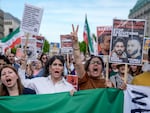
Protesters attend a rally against a death sentence given to Toomaj Salehi, a popular rapper in Iran, and to support to the women of Iran, in Berlin, Germany, on Sunday, April 28, 2024. Iran's Supreme Court overturned Salehi's death sentence on Saturday, June 22, 2024, his lawyer Amir Raisian said.
Ebrahim Noroozi / AP
Iran’s Supreme Court overturned the death sentence of a government critic and a popular hip-hop artist, Toomaj Salehi — who came to fame over his lyrics about the death in police custody of Mahsa Amini in 2022 — his lawyer Amir Raisian said Saturday.
In a post on social media platform X, Raisian said that the court assessed the case and found Salehi's past six years in prison as "excessive" since the punishment was more than what was allowed by law. He added that another branch of the court will now review the case.
Salehi's death sentence in April by a Revolutionary Court in the central city of Isfahan created confusion as even Iran's state-run IRNA news agency and the judiciary did not formally confirm it. Such courts in Iran often involve closed-door hearings with evidence produced secretary and give limited rights to those on trial.
The news quickly drew international criticism from the United States and United Nations experts, who condemned it as a sign of Tehran's continuing crackdown against all dissent following years of mass protests.
Salehi was released from prison last November after spending a year there on charges that his supporters said were based on the hip-hop artist's music and participation in the protests that broke out in Iran over the death of Mahsa Amini, 22. Amini died in the custody of the country's morality police after being detained for wearing her hijab too loosely.
Salehi rapped about Amini in one video, saying: "Someone's crime was dancing with her hair in the wind." In another verse, he predicts the downfall of Iran's theocracy.
Shortly after his release last year, Salehi was sent to prison again after saying in a video message that he was tortured after his detention in October 2022. State media at the time released a video showing him blindfolded and apologizing for his words, a statement likely to have been made under duress. Later in 2023, a court sentenced Salehi to more than six years in prison.
United Nations investigators say Iran was responsible for Amini's death, and that it violently put down largely peaceful protests in a monthslong security crackdown that killed more than 500 people and saw over 22,000 detained.
Copyright 2024 NPR